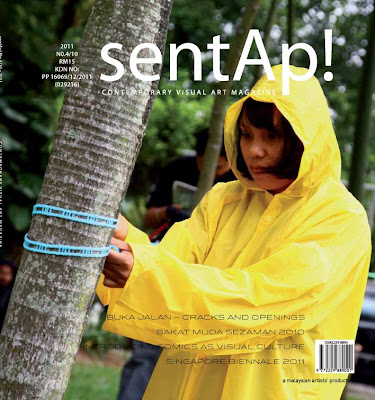Bila Tempua Bersarang Rendah

Tajuk: "Bila Tempua Bersarang Rendah 2"
Bahan: sarang tempua (bird's nets), kekabu (kapok/cotton), gauze,
Saiz: dimension variable, 2002
Pameran: TALI IKAT (Asian Fibre Art), Taman Budaya Jogjakarta, Indonesia
The Concept
"Jika tidak berada-ada masakan tempua bersarang rendah" (Malay Proverb)
The Malay saying has its English equivalent: Where there’s smoke there’s fire. Between those who care most for social cohesion and those who primarily value individual initiative there has been an age-long battle - In every such perennial controversy there is sure to be truth on both sides; there is not likely to be a clear - cut solution, but at best one involving various adjustments and compromises -Bertrand Russel, Authority and the Individual: pg.91.
Tempua @ Baya Weaver @ Finch (Ploceus Philippinus), is small dull looking bird - commonly found in the open country in Malay Peninsula, especially in the lowlands. Their nests are aesthetically pleasing and an architectural feat; built entirely of grass woven tightly together, flask-shaped, rounded at bottom, tapering up to the point where they are suspended from low branches. It has been observed that the nests are usually built in trees infested by fiercely biting red ants and hornets, an arrangement, which certainly works to the disadvantage of anyone who tries to climb up to them. Thus the Malay proverb. - MWF Tweedie, Common Birds of the Malay Peninsula.
In this post-modern globalised world, we have to learn to escape from our protective cocoons which have been shaped by the different values attached to them by our world-views, physical surroundings, religious thoughts, political beliefs, economic strength, cultural expressions, technological capabilities etc. We should de-form and thence re-form our intellects, emotions and mode of interpretation accordingly and refrain from being a tool to demagogues in order to be a true universal person. As long as we remain obstinate in our personal warm nests and cocoons, and tenaciously embrace our own individual Weltanschauung without trying to understand other people’s beliefs and other societies’ values, we will never be able to create harmonious and peaceful surroundings. Mutual intellectual understanding and emotional tolerance shall permit us the various prerequisite adjustments and compromises necessary for the manifestation of universal placidity and affectionate brotherhood.



Comments